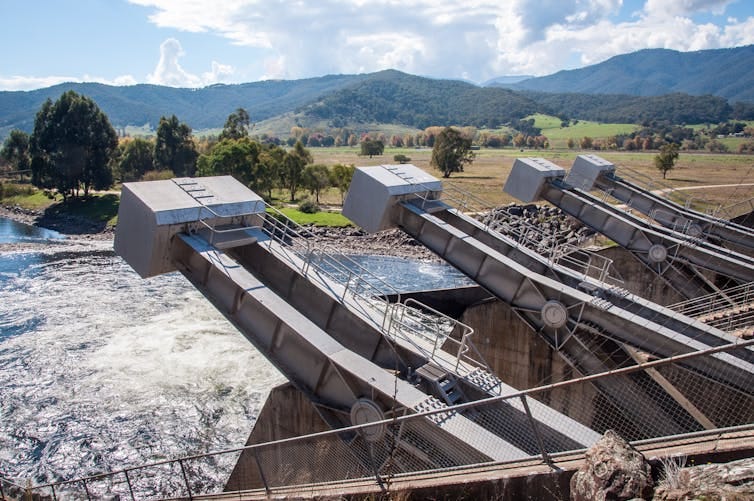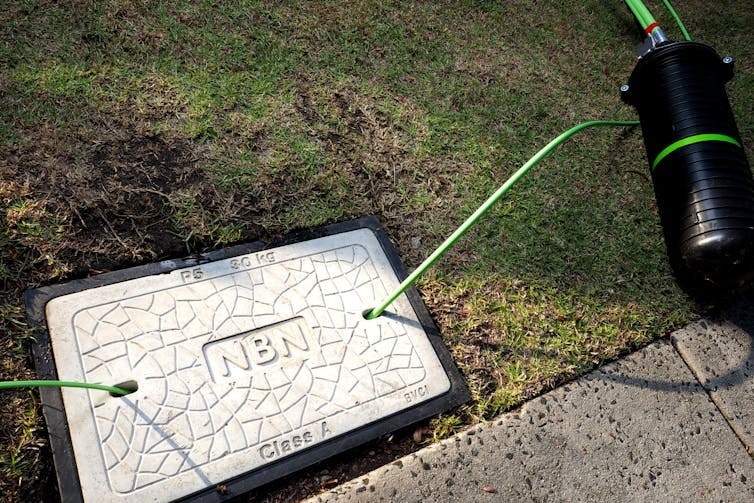Achieving net zero with renewables or nuclear means rebuilding the hollowed-out public service after decades of cuts
Another belated reprint, from The Conversation, 27 June
Opposition Leader Peter Dutton’s plan to build seven nuclear power plants in Australia has attracted plenty of critical attention. But there’s a striking feature which has received relatively little discussion or criticism: the nuclear plants would be publicly owned and operated, similar to the National Broadband Network (NBN).
On the contrary, it received enthusiastic endorsement from free-market advocates such as The Australian’s Judith Sloan, who observed: “It’s how the French nuclear plants were first constructed.” It is also the way Australia built its biggest single piece of energy infrastructure, the Snowy Mountains Scheme.
But there’s a fundamental problem here. Over the last three or four decades the federal public service has been hollowed out in the name of “new public management”. This became very clear during the COVID pandemic, when state governments – who have preserved their ability to act far better – ran most of the response. There is a very real question over whether we have the governmental capacity to achieve net zero.

From NBN to National Nuclear Network?
Dutton’s acknowledgement of the publicly owned NBN as a model worth using is a welcome advance on the view of Malcolm Turnbull, one of his predecessors as Liberal leader.
A decade ago, then-prime minister Turnbull embarked on a disastrous “mixed mode” redesign of the NBN. This reflected his belief – expressed publicly after leaving office – that a publicly owned broadband network should never have existed.
Labor is in no position to oppose Dutton’s calls for public ownership. State Labor governments in Victoria and New South Wales have re-established publicly owned electricity enterprises, while South Australia’s Labor government has floated the same idea.
Whatever technological choices we make, it is clear our days of relying on the private sector to provide vital infrastructure are coming to an end. The question now is whether the public sector can recover to take the lead.
The National Energy Market, for instance, was meant to promote competition and drive electricity prices down. It has failed to do so, resulting in a string of government interventions, some more successful than others.
Arguably the biggest failed intervention was the now-defunct Energy Security Board, a politically driven response to South Australia’s statewide blackout in 2016.
The board sought to patch up the National Energy Market with a capacity market, which was immediately dubbed “CoalKeeper” due to incentives for old coal plants to keep going, as well as new grid access charges, promptly dubbed “Solar Stopper” due to discouraging new investment in solar. Energy experts did not favour this approach.
What proved more successful as a response to South Australia’s big blackout was the decision by the state government to fund the Horndale big battery, which was, when built in 2017, the world’s largest utility-scale battery storage.

Should new power be private or publicly owned?
Both major parties are flagging more intervention. The federal government has stopped waiting for markets to provide clean energy in favour of seeking tenders for new renewables through a capacity investment scheme. The scheme received 40 gigawatts worth of bids from renewable developers, far beyond the goal of 6GW.
This shift has come in response to developments bogging down, hampered by inadequate regulation and local opposition driven by a combination of genuine concerns about environmental impacts and culture-war driven science denialism.
Labor’s current renewables-led strategy requires 10,000 kilometres of new publicly built transmission lines, to meet our net zero goals. We’d need even more transmission if we are to become a major exporter of clean energy, either as electricity or in products such as green hydrogen and ammonia.
On the Coalition side, no private firm is likely to accept the risks involved in creating a nuclear power industry from scratch. Government would have to lead.
As Nationals leader David Littleproud has now acknowledged in relation to finding sites for nuclear plants, the national need for clean energy is too important to allow “not in my backyard” opponents – some with only a tenuous connection to the area in question – to slow or stop government plans.
If government is to lead, it must have the capacity
What Dutton’s nuclear gambit shows us is that, surprisingly, Australia’s two major political parties are in strong alignment on the need to rebuild state capacity.
Whether it’s Labor working to get transmission lines and offshore wind up and running or the Coalition working to create a nuclear industry from scratch, it will take a strong government with the capacity to articulate a plan, and the legal, financial and human resources to make it a reality.
All of these requirements were met when we constructed the Snowy Mountains Scheme, a decades-long federal government initiative undertaken in cooperation with Victoria and NSW.
Are they still in place? Not yet. Government capacity to act has been eroded over decades of neoliberalism. Particularly at the national level, public service expertise has been hollowed out and replaced by reliance on private consulting firms.
To rebuild the federal government’s capacity to act will require recreating the public service as a career which attracts the best and brightest graduates – many of whom currently end up in the financial sector.
The private sector still plays a central role in the construction of infrastructure, as was the case with the Snowy Scheme. But it’s up to governments to take the lead in finance and planning.
This poses particular challenges for the Liberal Party, which has long favoured the interests of businesses small and large, and has been historically opposed to public ownership. But from the late 1990s until relatively recently, Labor was also keen on privatisation.
The French Prime Minister Georges Clemenceau once observed that “war is too important to be left to generals”. As we are discovering to our cost, infrastructure investment is similarly too important to be left to private investors.
Read my newsletter
I detect in your last few posts the germ of an argument:
1. Net zero is imperative for Australia.
2. Nukes may be a technological path to net zero, but make no economic sense.
3. The Right loves them some nukes and hates all other net zero.
4. (???) Given political economy, nukes may nevertheless make some sense.
Dutton’s embrace of a publicly run Nuclear industry without the expertise in the public service is an open embrace without any sense of contradiction of their magical thinking, whereby politicians claim to stimulate the economy and support jobs by cutting a tenth of the Public service (as Abbott did). The "cutting of Red Tape" and the cutting of more than a tenth of the public service during Abbott's time alone has had consequences. They stripped the size of the government to the point that it is incapable of functioning correctly for normal public functions, and now Dutton wants them to run a nuclear industry? WTF? Seriously? And who will build this with most of our manufacturing industry gone (thanks Hockey).
The consequences of the decimation of manufacturing and Public service under conservative rule have impacted other industries, such as education. The decline destroyed yet another training base for trades and reduced the intake of apprentices. The budget cuts of Abbott's administration also severely impacted apprenticeships. Tracking the causes, consequences, and level of damage to our employment economy has been made all the more complicated by Abbott's savage dismantling of expert advisory panels as compiled by Sally McManus. The elimination of free university education has resulted in a dumbing down of the Australian population. Where in the world are we getting the nuclear expertise?
The deteriorating of education results in quality standards in Australian Universities based on economic capacity to enter education and the resultant financial pressure to pass mediocre students, as opposed to passing them based on intellectual demonstrations of their quality of academic work. Identical circumstances exist in other Western countries. So, do we want these inferiorly qualified people running nuclear plants? FFS! (Sorry, I shouldn't be swearing twice in one comment, but... FFS!)